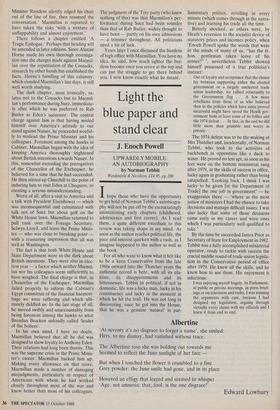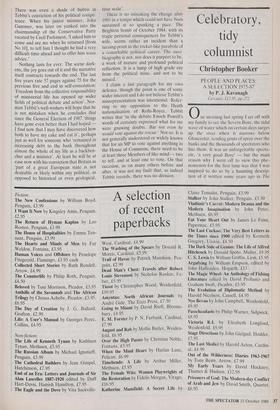Light the blue paper and stand clear
J. Enoch Powell
UPWARDLY MOBILE: AN AUTOBIOGRAPHY by Norman Tebbit
Weidenfeld & Nicolson, £14.95, pp.280
Ihope those who have the opportunity to get hold of Norman Tebbit's autobiogra- phy will not be put off by the excruciatingly uninteresting early chapters (childhood, adolescence and first career). As I read them, a quite different exordium to this review was taking shape in my mind. As soon as the author reaches political life, the pace and interest quicken with a rush, as I imagine happened to the author as well as the book.
For all who want to know what it felt like to be a keen Conservative from the late 1960s onward into the Thatcher years the authentic record is here, with all its ela- tions, its disappointments and its bitternesses. Tebbit in political, if not in domestic, life was a lucky man, lucky in his constituency and lucky in the moment at which he hit the trail. He was not long in discovering, once he got into the House, that he was a genuine 'natural' in par-
liamentary politics, revelling in every minute (which comes through in the narra- tive) and learning his trade all the time.
Bitterly shocked, as others were, by Heath's reversion to the socialist device of statutory prices and incomes policy, when `Enoch Powell spoke the words that were in the minds of many of us, "has the rt. hon. gentleman taken leave of his senses?" ', nevertheless Tebbit showed himself possessed of a true politician's instinct:
Out of loyalty and acceptance that the choice lay between supporting either the elected government or a largely unelected trade union leadership, we rallied reluctantly to the Government flag . . A few more rebellions from those of us who believed then in the policies which have since proved successful might have saved the Heath gov- ernment from at least some of its follies and the 1974 defeat . . . In fact, in the end we did little more than grumble and worry in private.
The 1974 defeat was to be the making of Mrs Thatcher and, incidentally, of Norman Tebbit, who took to the activities of backbench ,in opposition like a duck to water. He proved no less apt, as soon as his feet were on the bottom ministerial rung after 1979, at the skills of success in office, lucky again in graduating rather than being catapulted. 'Looking back, I think I was lucky to be given [at the Department of Trade] the one job in government' — he exaggerates there — 'where as the most junior of ministers I had the chance to take decisions and manage difficult issues. I was also lucky that some of those decisions came early in my career and were ones which I was particularly well qualified to take.'
By the time he succeeded James Prior as Secretary of State for Employment in 1982, Tebbit was a fully accomplished ministerial operator, ready to tackle with success the crucial middle round of trade union legisla- tion in the Conservative period of office after 1979. He knew all the skills, and he knew how to use them. His enjoyment is infectious:
I was enjoying myself hugely. In Parliament, at public or private meetings, in press brief- ings or on television and radio, I was winning the arguments with ease, because I had designed my legislation, arguing through virtually every clause with my officials and I knew it from end to end.
There was even a shade of hubris in Tebbit's conviction of his political compe- tence. When his junior minister, John Gummer, was later on yanked into the chairmanship of the Conservative Party vacated by Cecil Parkinson, 'I asked him to come and see me when he returned [from No 10], to tell him I thought he had a very difficult time ahead and to offer him some advice.'
Nothing lasts for ever. The scene dark- ens, the joy goes out of it and the narrative itself contracts towards the end. The last five years rate 57 pages against 75 for the previous five and end in self-consolation: 'Freedom from the collective responsibility of ministerial life has opened up wider fields of political debate and action'. Nor- man Tebbit's well-wishers will hope that he is not mistaken when he concludes that since the General Election of 1987 'things have gone even better than I had hoped I find now that I may have discovered how both to have my cake and eat it', perhaps just as well for someone who 'remained in increasing debt to the bank throughout almost the whole of my life as a backben- cher and a minister'. At least he will be at ease now with his conviction that Britain as 'part of a great European state is not desirable or likely within any political, as opposed to historical or even geological,
time scale'.
here is no mistaking the change after 1983 in a tempo which could not have been sustained at so spanking a pace. The Brighton bomb of October 1984, with its tragic personal consequences for 'Tebbit's wife, seems rather an incident than a turning-point in the rocket-like parabola of a remarkable political career. The auto- biography is not, nor does it purport to be, a work of mature and profound political reflection. It is a lump of high grade ore from the political mine, and not to be missed.
I claim a last paragraph for my own defence, though the point is one of some wider interest and I do not believe Tebbit's misrepresentation was intentional. Refer- ring to my opposition to the Heath nationalisation of Rolls-Royce, Tebbit writes that 'in the debate Enoch Powell's words of certainty expressed what for me were gnawing doubts. But not even he would vote against the rescue.' Not so. It is not generally understood or widely known that for an MP to vote against anything in the House of Commons, there need to be at least three Members of like mind - two to tell, and at least one to vote. On that occasion, as on many others before and after, it was not my fault that, as indeed Tebbit records, there was no division.



























































 Previous page
Previous page